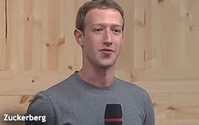
Why did Facebook “force” users to download a distinct Facebook Messenger app to send and receive messages on their mobile devices?
“We really believe that [a separate
Messenger app] is a better experience,” CEO Mark Zuckerberg said this week during a town hall meeting at Facebook headquarters.
“On mobile, each app can really focus on doing
one thing well, we think, and the primary focus of the Facebook app, today, is News Feed,” Zuckerberg explained. “What we saw is that all of the messaging apps that people were using, and
that they relied on the most, were kind of these dedicated, focused experiences.”
Zuckerberg admitted that requiring its roughly 1.3 billion users to install a separate messaging app was
a “big ask.” Yet even though “it was a short-term painful thing to ask people to install [another app], we knew we could never deliver the [right] quality experience as just a tab in
the main Facebook app."
advertisement
advertisement
Still, why not give people the option of using a distinct messaging app, or continue messaging through Facebook’s core app? “What we’re trying to do
is build an experience and a service that’s good for everyone in the community,” Zuckerberg said. For instance, “one of the things we found is that because Messenger is faster and
more focused, if you’re using it, you respond to messages faster.”
Despite a lot of grumbling from users, Facebook has been mostly quiet on the subject since splitting off
Messenger, earlier this year. Previously, users could access the service from within Facebook’s core mobile app.
Within the industry, the decision is widely believed to be part of a
broader strategy by Facebook to diversify its app offerings in order to create additional
revenue streams, and increase overall mobile usage rates.
In June, Facebook launched a Snapchat-like app, Slingshot, which lets users share pictures and video along with text to friends. More
recently, Facebook launched Rooms -- a platform for people to connect based on
similar interests rather than social ties.
As was clearly demonstrated by his decision to buy WhatsApp for $19 billion, Zuckerberg thinks mobile messaging is a big deal. In fact, Zuckerberg
said that messaging is now “one of the few things that people actually do more than social networking.”
“In a lot of countries, we’ll see that maybe 85% of the people
who are online will use Facebook, but maybe 95% of people -- or in some places 99% -- will use SMS or sent text messages,” Zuckerberg said this week.
The town hall meeting was a first
for Facebook. Zuckerberg said he has invited staff to partake in weekly Q&A sessions for years, but the company has never before published an unedited video stream of the sessions as it did with
this week’s town hall.
“We really believe in openness and communication, and that’s kind of what Facebook is all about,” Zuckerberg said of the Q&As. “But,
it’s also really important for the company to get feedback … and to learn what’s on people’s minds.”